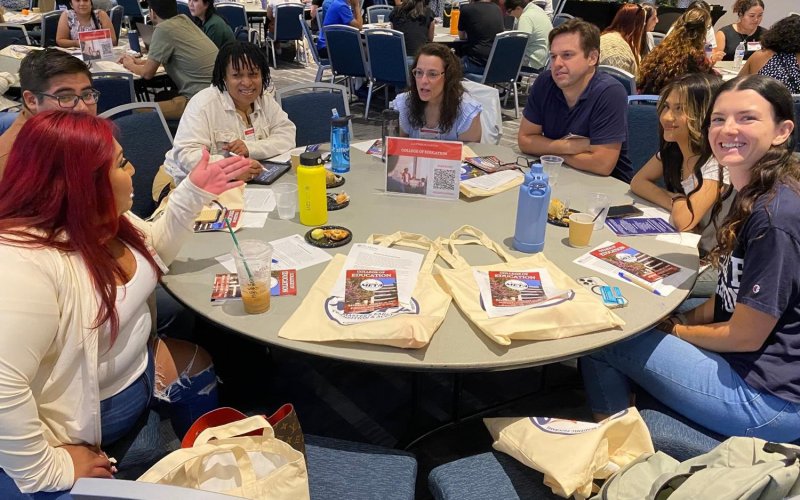
Getting accepted into graduate school is a difficult challenge, but knowing what to expect is even more of a challenge. That is especially true for first-time Latinx graduate students. The odds of having a parent with a postgraduate degree — and thus insight into graduate school life and culture — is three times higher for white grad students (29%) than for students of color (9%).
That is why Cal State Fullerton’s Project upGRADS hosted its fourth Master’s Early Access and Transition, also known as META, summer bridge program for new Black, Latinx and other first-generation graduate students. Project upGRADS is funded by a Department of Education Title V Program for the Promotion of Post-baccalaureate Opportunities for Hispanic Americans. The program collaborated with CSUF Academic Programs to stage a large event spanning a weekend in August.
Thanks to the support and funding provided by Amir Dabirian, provost and vice president for academic affairs, almost 200 graduate students filled the Titan Student Union Portola Pavilion on Aug. 10 and 11. Their purpose was to share expectations and concerns, discuss graduate school habits and the challenges of work-life balance, to meet more than a dozen faculty members, and to become familiar with graduate expectations in writing and research.
In addition, students had the opportunity to explore campus resources, including Basic Needs Services, Black Student Union, Career Center, Counseling and Psychological Services, Children’s Center, Latinx Community Resource Center, Office of Graduate Studies, Pollak Library, and Student Recreation Center.
The 190 new grad students hail from the College of Communications, College of Education, College of Engineering and Computer Science, College of Health and Human Development, College of Humanities and Social Sciences, and College of Natural Sciences and Mathematics. Some of them shared their reactions to the META weekend at the closing reception.
“I learned the importance of academic healing,” said Neftali Mezton, a new graduate student in public administration discussing a workshop hosted by Alexandro Gradilla, associate professor of Chicana and Chicano studies. “The simplest of words and actions can have a lasting impact on others. It’s important for us to work on silencing the internalized negative noise.”
Mezton said she also felt grateful for Lucia Alcalá, associate professor of psychology, who spent the weekend talking to humanities students about writing and research. “Hearing her share her experiences and simplify the research process truly eased many anxieties. Now, I am eagerly awaiting the start of the semester,” said Mezton.
Araceli Magallanes, a first-generation Latinx grad student in kinesiology, added: “I love CSUF and I am grateful for the opportunities and the work I will be involved in. Now, after attending the META program, I see the possibilities are so much bigger and it has opened my mind to dig deep. I am eager to approach this chapter with what is in my heart.”
Michael Badillo, a student in social work, said that he felt a new resolve after the weekend: “META will change the way I approach graduate school by challenging myself to break the ice and meet more new peers and professors.”
Counseling student Ilse Lopez said she now feels one step ahead going into the semester.
“Coming from San Diego, I felt like a foreigner on this campus, but after META, I feel I have a community of other graduate students I can lean on,” said Lopez.
Renata Vasquez, who will be studying literacy and reading education, set up contact with an accountability partner and promised herself that she would start her semester authentically. This fall is Vasquez’s second attempt at grad school, and she said the META experience helped her grow her confidence and connect with a new community.
The experience also benefited faculty, many of whom serve as mentors in the Project upGRADS Faculty Graduate Mentoring Program. Huda Munjy-Ahmed, assistant professor of civil and environmental engineering, said she felt inspired by the enthusiasm of her cohort of new graduate students.
“They truly want to develop life-long connections and they came prepared to talk about things that are definitely outside of their comfort zones. I am so incredibly proud of them and excited to see what their future holds. I have in turn also learned so much from them,” said Munjy-Ahmed.
It was no different for students in the College of Communications, said Cynthia King, professor of communications. “Activities like this are vitally important for developing the sense of community that our graduate students need to thrive,” said King.
Now much more at home at CSUF, META scholars walked away with certificates of recognition, new information, new contacts, friends, and networks, and above all, a sense of worth and belonging that grad school environments don’t always offer first-generation students of color.